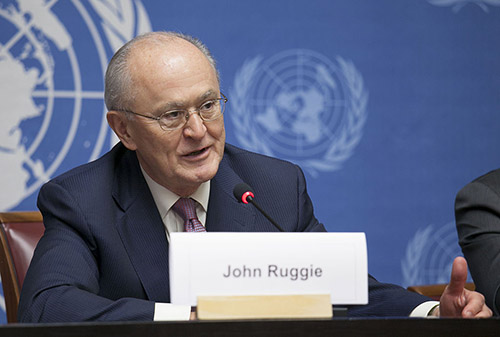John Ruggie Tribute
Modest, humble, self-effacing, gentle, calm, good humored, and generous—and at the same time one of the most powerful intellects and impactful scholar-practitioners of his time: that was my experience of John Ruggie. He was able to get things done that few others thought possible. I did not know him well and will speak here from the perspective of an interview I conducted with him for my book The Difference Makers in 2006. Around then Ruggie (along with his close colleague Jane Nelson) invited me to spend a year’s sabbatical at the Harvard Kennedy School (HKS) in 2006-7. He was a key figure—difference maker—in the book that resulted from that year of work. Ruggie had grown from humble beginnings to being a Professor at HKS and at the time in 2006 when interviewed director of its Mossavar-Rahmani Center for Business and Government, as well as Special Representative for Business and Human Rights at the UN, basically an advisor to then Secretary General Kofi Annan. Despite his highly theoretical approach for most of his career, John Ruggie has had probably more actual impact on the world than can be imagined in his storied career.

Since others can give better details of John’s earlier and later career than I can, I will mention only three major global initiatives that John was behind, all of which have deeply and positively influenced how the world, and particularly businesses, approach socio-ecological and human rights issues. Readers here well know he was the guiding dominant force behind the emergence and acceptance of the UN’s Guiding Principles on Business and Human Rights—a feat many had thought impossible to actually bring about because of previous failed efforts. Perhaps less well known, he was also the guiding force behind the development and emergence of the UN Global Compact, the world’s largest corporate responsibility initiative (and which itself has spawned numerous impactful initiatives in the ripple effects typical of such impacts, e.g., the Principles for Responsible Management Education and the Principles for Responsible Investing). Further, Ruggie wrote the initial draft of the Millennium Development Goals (MDGs), which morphed into the 17 globally agreed Sustainable Development Goals (SDGs) since 2015 when the MDGs ended.
In his interview for The Difference Makers, Ruggie talked about these two initiatives (the MDGs and UNGC), which were still relatively new at the time. He had been Dean of the School of International Affairs at Columbia when Kofi Annan was elected Secretary General at the UN, became (what was then called) Assistant Secretary General for Strategic Planning to Annan. When Annan asked him to come work full time for him, Ruggie asked, ‘What’s my job description?’ Annan’s response, ‘Well, don’t get swallowed up by the in-box.’ Far from letting that happen, Ruggie went on to ‘gradually move toward the creation of the Global Compact and a bunch of other things’, to use his words. And then, as he stated, ‘I went on to…I don’t know what the right verb is, I guess, invent the Millennium Development Goals’, because those were strategic issues that Annan wanted as longer term strategic objectives for the UN. Without the MDGs as a guiding template and initial foray into such global targets, it arguably unlikely that today’s SDGs would have ever come into existence.
In Ruggie’s telling the UN Global Compact was ‘sort of an accidental program’, though he and its first Executive Head, Georg Kell, had been working for some time to improve the UN’s relationship with businesses. They encouraged Annan to accept an invitation to Davos and, when he wanted something new to say, wrote the speech that ‘contained the elements of what became the Global Compact, except that it wasn’t intended as a program. It was intended as a challenge to the business community.’ We all, know the outcome: the UNGC: now with more than 12,000 signatories in over 160 countries, and a global force for responsible business practice.
As for the MDGs, Ruggie noted, ‘The opportunity of the Millennium Summit was just too good not to exploit.’ Ruggie was given the job of producing the Secretary General’s report. With Andy Mac and a small team, they developed a results-oriented global agenda. As he noted in his interview, ‘When it came time to propose measures for the Summit to endorse, we focused on the results and on ways to measure results and on ways of using targets as a social mobilization tool, and as a vehicle for engaging non-state actors as well.’ This agenda had fairly concrete targets that ‘got traction inside the system as a whole’, appealed to business because of the measurable objectives, making them useful as an engagement tool for businesses, and became part of political processes. Summing up—and highlighting his impressive intellect, Ruggie noted, ‘We thought about it all these ways, both as in internal terms and in terms of mobilizing the UN system and the Bretton Woods Institutions behind a common set of objectives that belong to everybody. Business engagement and then broadly social mobilization. And I think it’s worked remarkably well in all of those respects. Obviously, it hasn’t solved all the world’s problems, but no single thing does.’
That sense of vision, combined with practical realism, humility combined with grand objectives, and an uncanny ability for finding realistic ways forward despite many conflicting dynamics—that is the gift of John Ruggie to the world. And that doesn’t even speak to his impact with the UN Guiding Principles on Business and Human Rights, which others in this series can far better speak to than I can. He was a great man whose positive impact around the world will be felt for many years in untold ways. He will be missed.
Sandra Waddock is Galligan Chair of Strategy, Carroll School Scholar of Corporate Responsibility, and Professor of Management at Boston College’s Carroll School of Management. She is a member of the Steward Communications teams of Bounce Beyond and a member of the Steward team for GANE (Global Assessment for a New Economics). She has published over 170 papers and chapters and 15 books and received multiple lifetime achievement awards.





